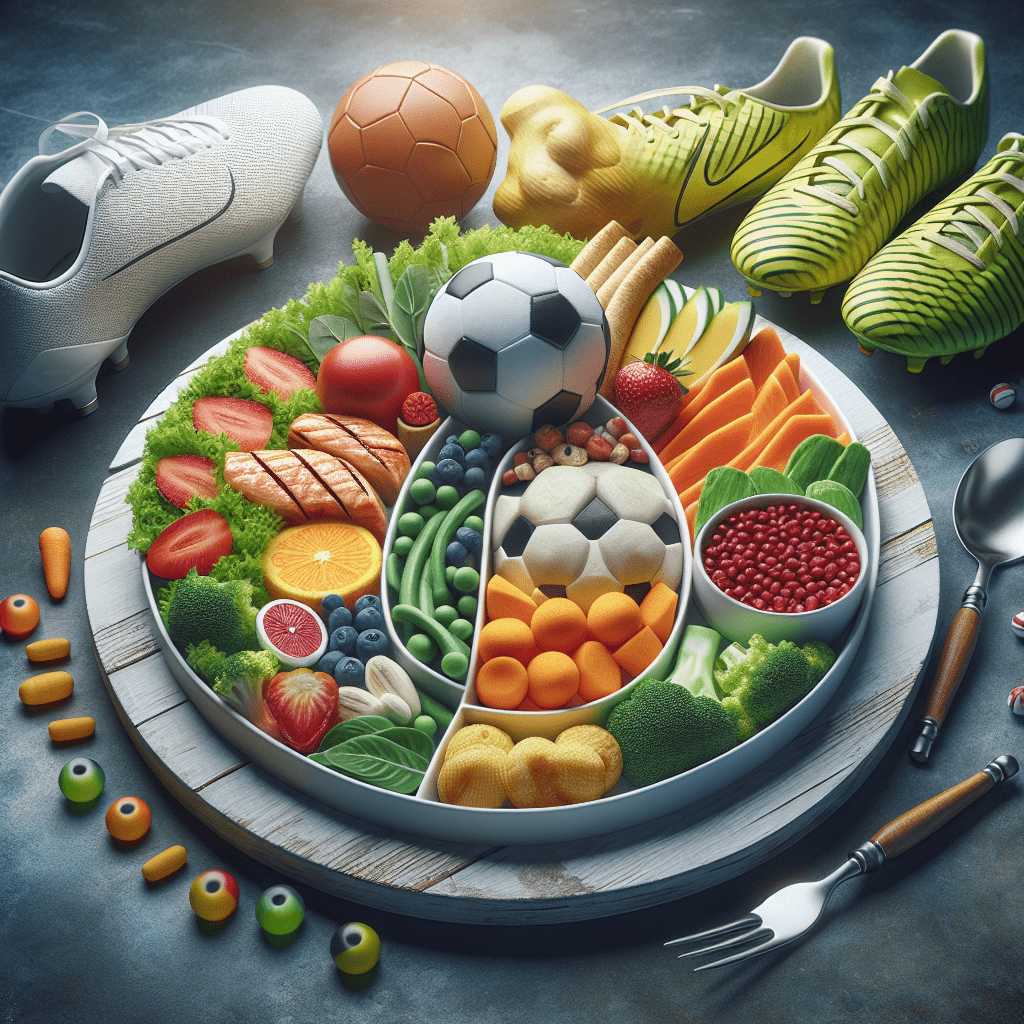[ad_1]
The Soccer Player’s Plate: What to Eat for Optimal Performance
Soccer is a sport that demands a unique combination of speed, stamina, agility, and strength. To perform at their best, players must adhere to a comprehensive training regimen complemented by a nutrition plan tailored to their specific energy needs. This article will delve into optimal dietary strategies for soccer players, aiming to maximize performance on the field.
Understanding the Energy Requirements
Soccer matches last for 90 minutes or more, requiring sustained energy output. The foundation of a soccer player’s diet should be carbohydrates, the primary fuel source during high-intensity activities. However, the importance of proteins and fats, alongside a variety of vitamins and minerals, cannot be overstated.
Carbohydrates: The Main Energy Source
Carbohydrates are stored in the muscles and liver as glycogen, which can be quickly converted to glucose, the body’s preferred energy source during intense exercise. Complex carbohydrates found in whole grains, vegetables, and legumes provide a slow and steady release of energy, while simple carbohydrates found in fruits can offer a quick energy boost.
Proteins: Building and Repairing Muscle
Soccer involves frequent starts, stops, and changes in direction, all of which put considerable stress on the muscles. Adequate protein intake is vital for repairing and building muscle tissue. Animal sources like chicken, fish, and lean beef provide all essential amino acids necessary for muscle recovery. Vegetarian players can rely on a combination of legumes, nuts, seeds, and whole grains to meet their protein needs.
Fats: A Source of Endurance Energy
While carbohydrates are the go-to energy source for short-term and high-intensity activities, fats become more important during prolonged exertion and at lower intensities. Including healthy fats from avocados, nuts, seeds, and fish in the diet can support long-term energy needs and overall health.
Hydration: A Critical Component
Hydration is crucial for peak performance. Soccer players should aim to stay well-hydrated before, during, and after matches and training sessions. Water is generally sufficient for hydration, but sports drinks can be beneficial during extended play to replenish electrolytes lost through sweat.
Micronutrients: The Unsung Heroes
Vitamins and minerals play pivotal roles in energy metabolism, muscle contraction, bone health, and oxygen transport. Iron, calcium, vitamin D, magnesium, and B vitamins are among the most important micronutrients for soccer players. A varied diet rich in fruits, vegetables, lean proteins, and whole grains should provide these essential nutrients.
Fueling Strategies: Before, During, and After Play
– Pre-Game Nutrition: The meal consumed 3-4 hours before a game should be rich in carbohydrates to maximize glycogen stores. It should also be low in fat and fiber to reduce the risk of gastrointestinal discomfort.
– During the Game: For matches and training sessions lasting longer than an hour, consuming small amounts of carbohydrates can help maintain blood glucose levels and delay fatigue.
– Post-Game Recovery: Post-game nutrition should focus on replenishing depleted glycogen stores and repairing muscle. A meal or snack high in carbohydrates and protein within 45 minutes after playing is ideal.
Sample Meal Plan for Soccer Players
A daily meal plan for a soccer player might look like this:
Breakfast: Oatmeal with banana and almond butter, paired with a serving of Greek yogurt for additional protein.
Mid-Morning Snack: A piece of fruit and a handful of nuts.
Lunch: A whole-grain turkey wrap with avocado, lettuce, and tomato, served with a side of carrot sticks.
Afternoon Snack: A protein shake made with milk and a scoop of whey protein, blended with berries.
Dinner: Grilled chicken breast with quinoa and a large portion of mixed vegetables.
Before Bed: Cottage cheese with pineapple, offering a slow-releasing protein source to aid muscle recovery overnight.
FAQs
1. How much protein do soccer players need?
Soccer players should aim for approximately 1.2 to 1.7 grams of protein per kilogram of body weight per day, depending on training intensity.
2. Can a vegetarian or vegan diet meet the nutritional needs of a soccer player?
Yes, with careful planning, vegetarian and vegan soccer players can meet their nutritional requirements. Plant-based proteins, like legumes, tofu, and quinoa, are excellent sources.
3. How important is hydration for soccer players?
Hydration is critical. Even small degrees of dehydration can impair performance. Soccer players should drink water regularly throughout the day and more intensely around training and matches.
4. What should a soccer player eat right before a game?
Choose a small, carbohydrate-rich snack low in fiber and fat, such as a piece of fruit or a granola bar, about an hour before the game to top off your energy reserves.
5. How can a soccer player ensure they are getting enough vitamins and minerals?
Eating a varied diet rich in fruits, vegetables, lean proteins, and whole grains is the best strategy. In some cases, a multivitamin supplement may be beneficial, but it’s best to consult with a healthcare professional first.
In summary, optimal nutrition is a key component of peak performance in soccer. By fueling the body with the right balance of carbohydrates, proteins, fats, and micronutrients, soccer players can enhance their endurance, strength, recovery, and overall health, ensuring they’re always ready to perform their best on the pitch.
[ad_2]






